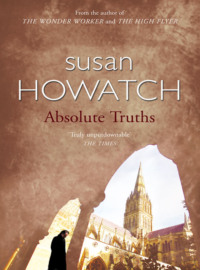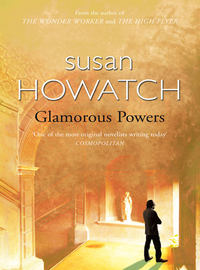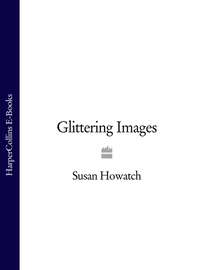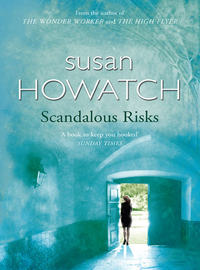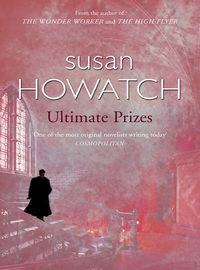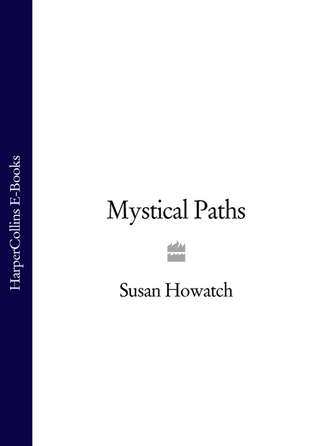
Полная версия
Mystical Paths
‘… so Father Darcy said to Francis …’ My father was still deep in his Fordite reminiscences. ‘… and then Cyril said to Aidan …’
I decided it was time to haul him back to 1963. ‘Can we return to Christian for a moment?’
My father recalled himself with an effort and said politely: ‘Of course.’
‘Are you saying I was completely deluded?’
‘No. I’m not doubting for one moment that you experienced a dark force that frightened you. All I’m saying is that you may not only have misinterpreted this force but mislocated it as well. You’re so young, you see, Nicholas, and you’re not trained. If only we could find you your Father Darcy –’
Off he went again. Hopeless. I gave up, muttered some excuse and slipped away.
VI
I came down from Cambridge in the summer of 1964. I hadn’t seen Christian again. Eventually I came to accept my father’s opinion that Christian’s attitude to me had been wholly benign, but I couldn’t forget my impression that something was far out of alignment in his psyche, and this dislocation, hinting at a personality being eroded by the Dark, made me unwilling to seek him out by attending Marina’s parties. Declaring that I was wholly preoccupied with swotting for my finals I refused every Coterie invitation that came my way.
However the Dark seemed to be waiting for me wherever I went in those days. It was certainly waiting for me when I blazed off to Africa to work for the Christian Trail Scheme which encouraged young people to bring the skills of the advanced countries to small rural villages in the Third World.
I was in such a bad state after I got in my mess with the witch-doctor that I had to be sent home. I thought I could handle the bastard by performing a simple exorcism, but I was far, far out of my depth. He put a curse on me. I began to feel ill. I knew the illness was psychosomatic and idiotic, but that made no difference. I wilted. Then I panicked. I flew home thinking the plane would crash. My father had been driven to Heathrow airport to meet me by Martin, who was in the midst of making a new series of his TV comedy ‘Down at the Surgery’, but I barely saw Martin. I just staggered into my father’s arms and stuck there, once more transformed into the little boy, temporarily autistic, who had screamed in terror until his father had turned up to put things right.
As soon as I was alone with my father I said: ‘I’m never leaving you again, I can’t live without you being nearby to save me,’ and I began to sob. Total regression. Pathetic. I’m almost too ashamed to admit it, but I was so frightened that I couldn’t sleep at the house and had to camp at his cottage. Apart from the bathroom and the kitchen there was only one room but I slept in a sleeping-bag on the hearth with the cat. Whitby the Fourth, all furry warmth, exuded comfort. Funny how well animals can relate to humans. I stroked and stroked that cat so often that it was a wonder all his fur didn’t fall out. My father talked to me, prayed with me, helped me to be calm. Eventually the nightmares stopped and I no longer felt the Dark was trying to press through the huge cracks in my psyche. The cracks healed up, welded together by the Light which exuded steadily from my father.
‘No demon can withstand the power of Christ,’ said my father, repeating the words he had used long ago, and what he meant was that no dissociated mind can withstand the integrating power of the Living God whose spark lies deep in the core of the unconscious mind and who can not only heal the shattered ego but unify the entire personality.
‘Maybe you should forget about doing further voluntary work and go to the Theological College this autumn,’ said my father when I was better. I think he believed I’d meet my Father Darcy at the Theological College, but at that point my pride staged a resurrection and I said no, that would mean the witchdoctor had won some sort of victory, and no one, least of all an old bugger of a witch-doctor, was going to deflect me from my chosen course.
But I didn’t go far away again. The Mission for Seamen, scene of my next attempt at voluntary work, was fifty miles away in the port of Starmouth, but I had a car which enabled me to bolt for home on my days off. After that job too ended in chaos I moved even closer to my father, but I didn’t start work at the Starbridge Mental Hospital until 1966. It was in the summer of 1965, when I was at the Mission for Seamen, that Christian drowned in the English Channel off the Isle of Wight.
He had been sailing with Perry Palmer. Perry kept a boat at Bosham, near Chichester, and they had formed the habit that summer of sailing every weekend. The catastrophe was caused by a freak wave which had flung Christian overboard; the theory was that he had hit his head and lost consciousness before he had even entered the water, for he had apparently made no attempt to swim for survival. The incident was reported in the national press not because it was an unusual sailing accident but because any event touching the life of Marina Markhampton was judged to be fodder for the gossip columns.
The story ran its course. Eventually the tragedy was allowed to fade from the public consciousness and the newspapers stopped photographing Marina and Katie weeping into black handkerchiefs.
The body was never found.
VII
Life lurched on. I staggered from mess to mess until I was so unnerved that I did take a premature retirement from voluntary work after all. Then I promptly fell into that other mess when I performed the Bridey Murphy experiment on Debbie and couldn’t wake her from the trance. After that came the dead terms at Theological College culminating in the events of 1968 when I got engaged to Rosalind, found myself unable to stop bedding Tracy and sought help frantically but unsuccessfully from my formidable ‘Uncle’ Charles Ashworth, the Bishop of Starbridge. And finally, in that same spring of 1968, nearly three years after Christian’s death and five years after the Starbridge party where I had first met him, Marina arrived at Starrington Manor in a white Jaguar and asked to see me.
I was at home for the Easter vacation. That year Easter Sunday was not until the fourteenth of April, so even though March had finished there were still several days of Lent remaining. The Theological College at Starbridge aligned its terms with those of Oxford and Cambridge except in the summer; then the College slipped in a fourth term, but those who were due to be ordained on Trinity Sunday were allowed to skip this extra spell of labour and leave directly after ordination. I was heading for ordination and the third and final term of my second year.
On the morning of Marina’s arrival I was trying to follow the Bishop’s advice by praying for grace – the grace to be chaste while I waited for my trip to the altar – but praying in a conventional fashion (with words) didn’t seem to be getting me very far. Praying in words hardly ever did. Finally I decided to pray my way, which meant I lit a candle, sat cross-legged on the floor, stared into the flame, flipped the switch in my head and tuned in.
Sometimes when I prayed I began by reciting the mantra but usually it wasn’t necessary; other people might need a mantra in order to tune in, but I just flipped the switch. I tended to save the mantra for those times when I was overwrought and needed to calm myself down. Father Peters had originally taught me this technique after my mother died, and he favoured no one mantra but used various key phrases from the Bible. It was my father who always used the famous Orthodox prayer ‘Lord Jesus Christ, Son of God, have mercy on me, a sinner’, and nowadays I followed his example. It’s pathetic that so many people turn to the East for meditative techniques nowadays, and one of the greatest failures of the Church in this century lies in the fact that the strong tradition of meditation in Christianity is so little known.
I never thought of reciting the mantra as praying, although it is. For me the real prayer came afterwards when the mantra had done its work and the conscious mind was relaxed, beyond words, in touch with the centre, soaking luxuriously in the Light. Father Peters had told me that if I was in an overstrained state I should stop after the recitation of the mantra had been completed because otherwise I ran the risk that dark forces in my unconscious mind might elbow aside the benign effects of the mantra and rise to the surface with unpleasant results. I was quite prepared to follow this advice but I couldn’t resist telling him that usually I didn’t need the mantra and could achieve the same effect just by flipping the switch in my head.
That was when Father Peters had warned me against Gnosticism which claimed, among other things, that only a spiritual élite with esoteric knowledge could attain salvation. He classed my act of flipping the switch as esoteric knowledge and said it was a psychic snare, fostered by the Devil, to make me think I was special. He said one must approach God through Christ; in this form of prayer saying a mantra which invoked Christ was the correct approach; with all my talk of the Light and the Dark I wasn’t sufficiently Christ-centred, but it was Christ in his humility who kept psychics like me on the rails, not Gnostic code-words, Gnostic élitism and that fatal Gnostic pride.
‘Well, of course as an Anglican-Benedictine monk he had to say that, no choice; he had to toe the orthodox line. But in my opinion I was quite sufficiently Christ-centred in my belief, and if God had given me a switch to flip in order to tune in to Him, why shouldn’t I flip it? And what was wrong with using code-words? Father Peters used code-words himself when he resorted to old-fashioned picture-language and talked of the Devil. One used code-words and symbols all the time when dealing with spiritual reality; it was the equivalent of the way scientists used mathematics to express the truths of physics. Flipping the switch given by God to tune in to the Light – to switch on the current of Ultimate Reality – to merge with the Ground of One’s Being – to touch the transcendent Creator who sustained the universe – whatever words one chose to describe the indescribable – was GOOD. And I knew that, I just knew; it was ‘gnosis’.
I did accept that when one was in a state of altered consciousness one had to be careful about warding off the dark forces in the unconscious mind, but I’d never found that a problem. Flipping the switch short-circuited them and the Light just blotted them out. I might suffer an attack by the Dark in other circumstances, but not when I was flipping the switch which Father Peters had so stuffily dismissed as a psychic snare.
‘Oh, bugger Father Peters!’ I said crossly to myself that morning as I lit the candle, stared into the flame and flipped the switch.
The candle went out.
I was so startled that I just stared open-mouthed at the smoking wick. Then I realised I’d left the window open and there was a draught. Closing the window I relit the candle, resumed my cross-legged position on the floor and switched on again, but now something had gone wrong with the switch. The Light was marred by a sort of cloud, or maybe it was mud – I mean, it was nothing I could see, but ‘cloud’ and ‘mud’ were the words which came closest to describing it. I felt as if I were driving a car with a dirty windscreen through thick fog.
Nasty. This psychic pollution meant I was overstrained and that in turn meant it was one of those occasions when I was unable to dispense with the mantra. I needed to have my conscious mind calmed by the constant repetition of words. Off I started. ‘Lord Jesus Christ, Son of God, have mercy on me, a sinner …’ I kept that up with no problem for several minutes but then realised I was thinking of Tracy’s breasts. I kept on reciting – that’s very important with the mantra, one should never stop before the allotted time has finished – but I found myself wondering if I needed to do some special breathing exercises. In the end I broke off the mantra – bad practice but I was getting nowhere – and lay full length on the floor so that I could relax all my muscles in turn. My quest for a direct experience of God – a quest which should have resulted in the automatic elimination of all distracting images, even the sexual ones – looked now as if it might fail completely. I couldn’t understand it. The switch in my head never let me down unless I was in a bad state, the sort of state I had been in as the result of the witch-doctor mess, but at that moment I was normal and well-balanced.
Or so I thought.
I was just taking my third deep breath and trying to kill the suspicion that what I really wanted to do was masturbate, when the intercom buzzed.
I sat up and grabbed the receiver. ‘Yep?’
‘Marina Markhampton’s here to see you, Nicholas,’ said Agnes, the bossiest member of the Community.
I can still remember the exact quality of my relief as I realised I was being diverted from my attempt to pray. ‘Okay, I’ll come down.’
When I saw Marina she called me Nick instead of Nicky. That made me realise how far we had travelled since that innocent night six years ago in 1962 when I had commandeered her punt on the Cam. I was now twenty-five; she was twenty-six and had been engaged to Michael Ashworth since the previous autumn. When she called at the Manor that day to see me she was wearing a powder-blue mini-skirt, a clinging black sweater and a silver zodiac medallion. Her legs were encased in black stockings and her face was smothered in trendy make-up: white lipstick, black eyeliner and so much mascara that her eyelashes seemed to droop. Her natural blonde hair was very long and looked as if it had just been ironed.
We got on better now that we were older and could regard each other as people rather than accessories. When I started seeing her again after Christian’s death it occurred to me that our friendship had endured because of a certain ineradicable compatibility, even though we had at first been too immature to do more than strike poses in each other’s presence. I found her intelligent and pragmatic; beneath all the society gush there was something tough about Marina, the toughness of someone determined to survive no matter how adverse the circumstances. From a material point of view survival was hardly difficult for her. She was rich. But not all deprivation is financial.
I think she liked me because … well, why was it? Perhaps I represented reality amidst the phoniness of her society life. Or perhaps I represented safety in a world where most men were panting to bed her. Or perhaps I represented nothing at all but appeared to her as someone who (on his good days) could be just as intelligent and pragmatic as she was, one of those rare people in whose presence she could cast aside her affectations and be herself.
‘Nick, I’m terribly worried about Katie,’ she said as we sat down with our mugs of coffee. ‘She’s gone so peculiar.’
Automatically I murmured: ‘The effects of a bad bereavement –’ but Marina interrupted me.
‘It’ll be three years this summer since Christian died and she’s not getting better, she’s getting worse. She’s started dabbling in spiritualism.’
This did indeed sound tricky. ‘Dabbling?’
‘Buying books about it. Seeking out people who go for it in a big way. Now don’t get me wrong – I’m not particularly anti-spiritualism, there may well be something in it, I don’t know. But what I do know is that it’s a field stuffed with con-men who’d think nothing of exploiting a young widow who’s slowly going crazy with grief.’
‘Obviously she needs professional help. Perhaps her doctor could recommend –’
‘My dear, we’re well past doctors, she’s turned against anything orthodox, she’s way out there on the nutty fringes. Now look, Nick. She’s determined to try to contact Christian at a séance – and don’t tell me I’ve got to stop her because I know damn well I can’t. That’s why I’ve come to you for help.’
My heart sank. ‘But Marina –’
‘You’ve got to be the medium, Nick, got to be. You’re the only psychic I trust.’
I opened my mouth to say: ‘I don’t mess around with my psychic powers any more, it’s wrong, it’s dangerous, it’s asking for trouble,’ but the words which came out were: ‘Okay, where and when?’
I needed to be shaken till my teeth rattled.
The Christian Aysgarth affair had begun.
FOUR
‘[Man’s] failing has been the pride and egoism with which he aggrandizes himself, using his powers with aggressive or complacent self-assertion instead of using them in humble dependence.’
MICHAEL RAMSEY
Archbishop of Canterbury 1961–1974
Canterbury Pilgrim
I
I should never have involved myself in Marina’s plan, but I felt so sure that for once I could use my powers with benign effect. After all, I was no longer an undergraduate messing around with ouija boards – or even an innocent abroad locking horns with a witch-doctor. At twenty-five I thought I could give myself credit for some degree of maturity, but what I could never acknowledge was that in psychic matters I was no better than a precocious child who could recite the alphabet but who had never been taught to read and write.
There are basically two problems with séances. First, most dead people can be assumed to be at peace with God, in which case efforts to contact them are futile, and second, if the dead people aren’t at peace with God, the most sensible thing one can do is to leave them well alone because lingering shreds of discarnate spirits, as my father had often told me, are either trivial or demonic. I had no doubt that Christian was now at peace with God. It was true he had died ‘unhousel’d’ and ‘unanel’d’, cut off from life by a violent death when he was possibly not in a state of grace, but during his life he had been a good man – or as good as most men can hope to be – and I had no doubt that since his death various people had prayed that he might rest in peace. Why shouldn’t God have responded by exercising a loving forgiveness, healing those deep fissures which I had been so sure existed in Christian’s personality, and finally enfolding his soul? It seemed a reasonable assumption to make in the circumstances.
From that reasonable assumption it followed that the chances of making contact with Christian were nil. What was much more likely to happen in the séance was that Katie’s acute emotional distress would be projected from her psyche and cause havoc. That was why I planned not a séance but a pseudo-séance, a rite which might appear designed to contact Christian but which was in fact merely designed to help Katie. I thought that provided I kept my mind closed against any discarnate shreds of former personalities that happened to be floating around, I would be dealing not with the dead but with the living because what was really required of me in this situation was to be not a medium but a healer.
This attracted me, and was almost certainly why I had agreed against my better judgement to take part in Marina’s plan. Even now, when my head was stuffed so full of theology that I could have written a thesis about the transformation of the historical Jesus into the Eternal Christ of the Church, I felt irresistibly compelled to look straight past that multi-symbol image to the charismatic Galilean wonder-worker who had healed the sick and raised the dead.
‘I want to be a healer-priest when I grow up,’ I had announced at the age of eight after an enthralling game in which I had resurrected my tin soldiers, but my father had replied firmly that if I wanted to heal the sick I should train to be a doctor.
‘It’s true all priests are involved in the healing of souls,’ he had said, ‘but a ministry which centres on healing the physically and mentally sick is so extremely difficult and so fraught with danger that only priests with the strongest possible call to heal should attempt it.’
It was not until later that I found out about his brief, unsuccessful attempt to be a healer. Naturally he had assumed, since I was so like him, that if I tried to be a healer I would fail too.
But the fascination with healing had persisted, and now, years later, I found myself seduced by the challenge of restoring Katie Aysgarth to full mental health. The result was that I planned the pseudo-séance in a haze of euphoria.
Disgusting. No wonder my father prayed daily for another religious thug like Cuthbert Darcy to knock the hell out of me. I was like one of those typhoid carriers who bounce through kitchen after kitchen and leave a trail of disaster in their wake.
God knows how anyone I met ever survived.
II
The girls came down from Oxford the next morning. It was a showery April day, cool and fresh. Marina was wearing a white coat which matched the Jaguar, and a scarlet mini-dress. Katie, seven years her senior, was dressed more conventionally in a mustard-coloured suit. She looked pale, drawn, fragile.
Starrington Manor was a large house, but since I shared it with the Community I had been obliged to take measures to ensure my privacy: I had designated certain areas for my use only and I had devised stringent rules to restrict intrusion to a minimum. The library, a long room lined with unreadable books and cases of stuffed fish, was part of my territory, although Rowena and Agnes were allowed in to clean it. Here I received visitors. I liked the library better than the drawing-room, which always reminded me too painfully of my mother.
The entire area upstairs in the main section of the house was also my domain. I slept in the room which had once been my father’s study – his ‘cell’ he had called it in memory of his monastic years – and I spent my leisure hours nearby in the room which had once been my parents’ bedroom. Curiously, this area didn’t remind me of my mother; my father had imprinted his personality too strongly there. Rowena and Agnes were never allowed to clean in this upstairs domain. Once a week I changed the sheets on my bed and showed the Hoover to the carpet. I seldom dusted, but the bathroom fittings received my regular attention. I rather liked muscling around with the Vim. That was a masculine art. Dusting’s just for women.
Meanwhile, as I kept my domain utterly private and tolerably clean, the Community milled around on the ground floor (excluding the library) and slept in the wing which had been converted for the Theological College ordinands after the war. My father sometimes came up to the house for meals but usually he stayed in his cottage. In the chapel the Community said matins and evensong each day and my father celebrated mass. I always went to mass when I was at home, but except on Sundays I tended to avoid matins and evensong. I found that a little of the Community went a very long way.
When Marina and Katie arrived that morning I showed them into the library and brought them coffee to revive them after their journey. I could have held the pseudo-séance there, but I thought Rowena and Agnes might be tempted to listen at the door, so as soon as the coffee had disappeared I took the visitors to my sitting-room. None of the Community would have dared trespass on my upstairs domain without a valid reason. My father, who supported my quest for privacy, would have been too angry.
‘I feel it ought to be night-time,’ said Marina as she sat down at the round table which I had pulled to the centre of the room. ‘Doesn’t one get better results in the dark?’
‘One gets better fakes. People can be more gullible and the mediums more fraudulent.’ I moved around the room at a measured pace in order to exude the right air of authority; in any ritual it’s important to create a calm, dignified atmosphere which will not only impress the participants but put them at ease. I felt vaguely priest-like, pleasingly powerful. Having flicked an imaginary speck of dust from the table, I placed a heavy dictionary on top of the stack of Private Eye magazines by the bookcase, put away a couple of stray pencils in the top drawer of my desk and readjusted the engraving of Starbridge Cathedral which hung over the mantelshelf. Everything had to be securely in place. Although I was avoiding a traditional séance there was still the danger that Katie’s psyche could create a disturbance, and I didn’t want the magazines whooshing across the floor or the picture plunging off its hook. Such manifestations of kinetic energy can provoke hysteria.


